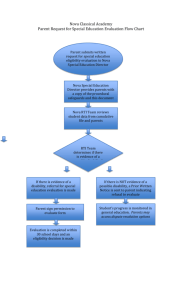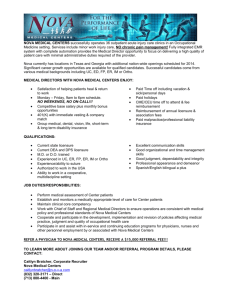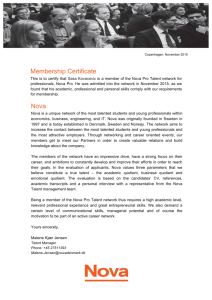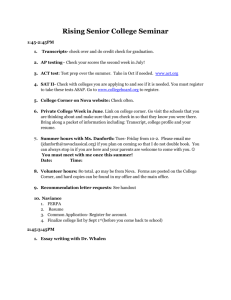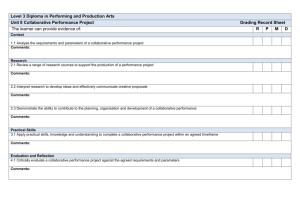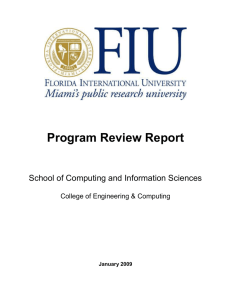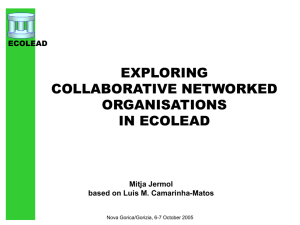Position Paper for Awareness in Collaborative Systems Submitted to
advertisement
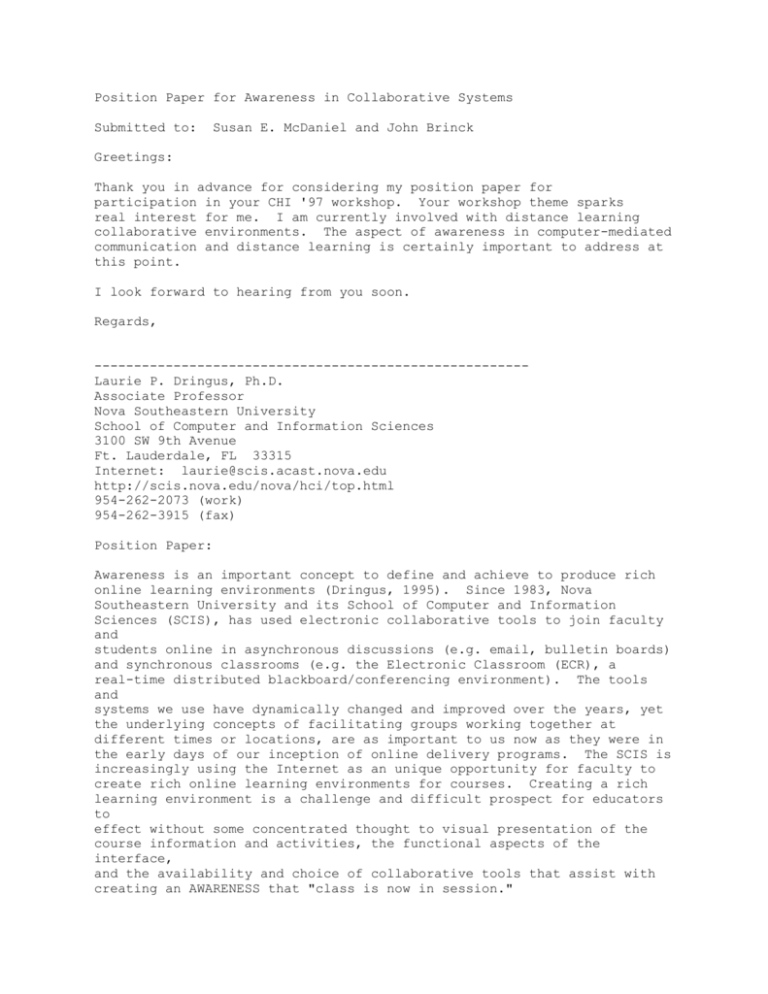
Position Paper for Awareness in Collaborative Systems Submitted to: Susan E. McDaniel and John Brinck Greetings: Thank you in advance for considering my position paper for participation in your CHI '97 workshop. Your workshop theme sparks real interest for me. I am currently involved with distance learning collaborative environments. The aspect of awareness in computer-mediated communication and distance learning is certainly important to address at this point. I look forward to hearing from you soon. Regards, ------------------------------------------------------Laurie P. Dringus, Ph.D. Associate Professor Nova Southeastern University School of Computer and Information Sciences 3100 SW 9th Avenue Ft. Lauderdale, FL 33315 Internet: laurie@scis.acast.nova.edu http://scis.nova.edu/nova/hci/top.html 954-262-2073 (work) 954-262-3915 (fax) Position Paper: Awareness is an important concept to define and achieve to produce rich online learning environments (Dringus, 1995). Since 1983, Nova Southeastern University and its School of Computer and Information Sciences (SCIS), has used electronic collaborative tools to join faculty and students online in asynchronous discussions (e.g. email, bulletin boards) and synchronous classrooms (e.g. the Electronic Classroom (ECR), a real-time distributed blackboard/conferencing environment). The tools and systems we use have dynamically changed and improved over the years, yet the underlying concepts of facilitating groups working together at different times or locations, are as important to us now as they were in the early days of our inception of online delivery programs. The SCIS is increasingly using the Internet as an unique opportunity for faculty to create rich online learning environments for courses. Creating a rich learning environment is a challenge and difficult prospect for educators to effect without some concentrated thought to visual presentation of the course information and activities, the functional aspects of the interface, and the availability and choice of collaborative tools that assist with creating an AWARENESS that "class is now in session." All of the aspects that the organizers describe in the first paragraph of the workshop participation call, are issues we must deal with on a continued basis in electronic/distance learning environments. We must consider "what information to provide, how to provide it, how to give users control of the information....." A well-designed online course nurtures collaborative communication and interactivity, whereby "awareness" is (or should be) in the control of the participant. Tools that support awareness as a concept of collaborative communication and interactivity form a mirror that reflects how the learning environment will be perceived by students and faculty as a dynamic location for communication and learning (Dringus, 1995). However, awareness has been difficult to concretely define. Not everyone agrees on what awareness is or the extent to which awareness should be conveyed. We have attempted to approach this by creating learning metaphors (such as the ECR) to strengthen the perception that a real-time environment exists to provide learners, at any-time and any-place, with ample opportunity for meaningful collaboration and discussion. How is awareness perceived? How do collaborative systems (and people communicating) effect this concept? How is a balance achieved between providing too much awareness (as in information overload, for example) and supporting the needs of learners without interfering with natural communication processes? I anticipate this workshop will assist me to explore the concept of awareness from a variety of angles as the organizers suggest in the workshop participation call. I am looking forward to extending the outcomes of this meeting to my current research in collaborative learning environments. Reference Dringus, L.P. (1995, Fall). Interface issues associated with using the Internet as a link to online courses. Journal of Interactive Instruction Development, pp. 16-20. Biography Laurie P. Dringus, Ph.D. is an Associate Professor in the School of Computer and Information Sciences at Nova Southeastern University, Fort Lauderdale, Florida, USA. She earned her Ph.D. in Information Systems from Nova Southeastern University in 1991. She teaches graduate courses in human-computer interaction and decision support systems. Several of her courses are accessible via the Internet. Her research interests focus on design and evaluation of human-computer interfaces, usability engineering, computer-mediated communications technology and user performance, group support systems, and distance learning environments. is: laurie@scis.nova.edu. Her Web site URL is: http://scis.nova.edu/nova/hci/top.html Her email address
